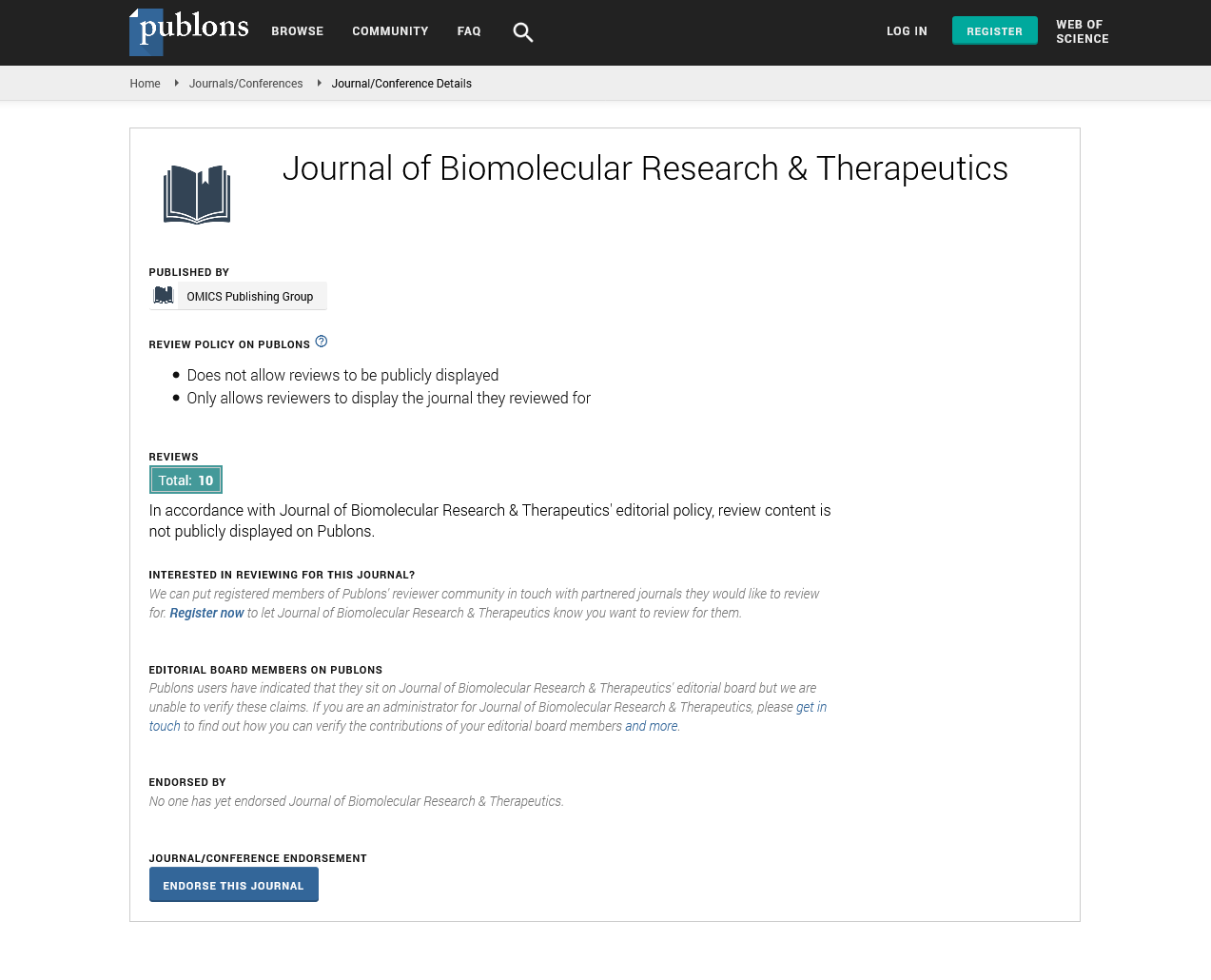Indexed In
- Open J Gate
- Genamics JournalSeek
- ResearchBible
- Electronic Journals Library
- RefSeek
- Hamdard University
- EBSCO A-Z
- OCLC- WorldCat
- SWB online catalog
- Virtual Library of Biology (vifabio)
- Publons
- Euro Pub
- Google Scholar
Useful Links
Share This Page
Journal Flyer

Open Access Journals
- Agri and Aquaculture
- Biochemistry
- Bioinformatics & Systems Biology
- Business & Management
- Chemistry
- Clinical Sciences
- Engineering
- Food & Nutrition
- General Science
- Genetics & Molecular Biology
- Immunology & Microbiology
- Medical Sciences
- Neuroscience & Psychology
- Nursing & Health Care
- Pharmaceutical Sciences
Perspective - (2023) Volume 12, Issue 6
Polymer Therapeutics for Inflammatory Diseases and Infections
Lincoln Miles*Received: 29-May-2023, Manuscript No. BOM-23-22359; Editor assigned: 01-Jun-2023, Pre QC No. BOM-23-22359(PQ); Reviewed: 15-Jun-2023, QC No. BOM-23-22359; Revised: 22-Jun-2023, Manuscript No. BOM-23-22359(R); Published: 30-Jun-2023, DOI: 10.35248/2167-7956.23.12.309
Description
Polymer therapeutics is a rapidly evolving field at the intersection of polymer science and medicine focusing on the design and development of therapeutic agents based on polymers. These innovative drug delivery systems aim to improve the efficacy, safety and bioavailability of therapeutic drugs. By combining the unique properties of polymers with the specificity of therapeutic agent’s polymer therapeutics offer numerous advantages over conventional drug delivery methods. It explore the principles, types, applications and future prospects of polymer therapeutics highlighting their potential to transform the landscape of medicine and Polymer therapeutics are based on the concept of combining therapeutic agents with biocompatible and biodegradable polymers to create drug delivery systems that can improve drug performance. The key principles of polymer therapeutics include Therapeutic drugs, including small molecules, proteins, peptides, nucleic acids and antibodies are encapsulated within or conjugated to polymer carriers. This encapsulation protects the drug from degradation enhances its stability and allows for controlled release. Many drugs, especially hydrophobic compounds suffer from poor solubility leading to reduced bioavailability.
Polymer therapeutics can improve drug solubility by incorporating hydrophobic drugs into hydrophilic polymer carriers. Polymer carriers can be functionalized with ligands or antibodies that specifically recognize and bind to target sites, such as tumor cells or inflamed tissues. This targeted drug delivery approach minimizes off-target effects and enhances drug accumulation at the desired site. Polymer therapeutics can prolong the circulation time of drugs in the bloodstream avoiding rapid clearance by the immune system. This extension of drug circulation allows for a sustained therapeutic effect and reduced dosing frequency. The polymer acts as a carrier and protects the drug from degradation and premature release. Polymer-drug conjugates are widely used for the delivery of anticancer drugs and other therapeutic agents. Nanoparticles are solid colloidal particles composed of polymers and can encapsulate therapeutic drugs within their core or on their surface. Nanoparticles can be designed to respond to specific stimuli such as pH or temperature changes for controlled drug release. Micelles are self-assembled Nano scale structures formed by amphiphilic polymers. In aqueous environments they can encapsulate hydrophobic drugs in their core while the hydrophilic shell stabilizes the structure and improves drug solubility. They can carry multiple drug molecules and have precise control over drug loading and release kinetics Hydrogels are three-dimensional networks of hydrophilic polymers that can absorb large amounts of water. They are used in localized drug delivery and tissue engineering applications. Polymer therapeutics has made significant contributions to cancer treatment. They improve the solubility and stability of anticancer drugs, enhance their accumulation in tumors through active or passive targeting and enable sustained drug release resulting in reduced systemic toxicity and improved therapeutic outcomes. Immunotherapy Polymer carriers can be used to deliver immunotherapeutic agents such as immune checkpoint inhibitors and cytokines to modulate the immune response against cancer or other diseases.However, there are several challenges that need to be addressed to fully realize their potential The biocompatibility and safety of polymer carriers are critical considerations for clinical translation. Extensive preclinical testing and toxicity assessments are essential to ensure the safety of polymer therapeutics. Some polymers may trigger an immune response in the body, affecting their effectiveness and stability. Strategies to minimize immunogenicity are being explored. The regulatory approval process for polymer therapeutics can be complex, requiring robust data on efficacy, safety and manufacturing processes. Polymer therapeutics is a rapidly evolving field at the intersection of polymer science and medicine focusing on the design and development of therapeutic agents based on polymers.
Citation: Miles L (2023) Polymer Therapeutics for Inflammatory Diseases and Infections. J Biol Res Ther. 12:309.
Copyright: © 2023 Miles L. This is an open access article distributed under the terms of the Creative Commons Attribution License, which permits unrestricted use, distribution, and reproduction in any medium, provided the original author and source are credited.

